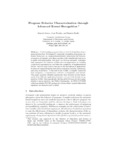Program Behavior Characterization Through Advanced Kernel Recognition

Ver/
Use este enlace para citar
http://hdl.handle.net/2183/22417Coleccións
Metadatos
Mostrar o rexistro completo do ítemTítulo
Program Behavior Characterization Through Advanced Kernel RecognitionData
2007Cita bibliográfica
Arenaz M., Touriño J., Doallo R. (2007) Program Behavior Characterization Through Advanced Kernel Recognition. In: Kermarrec AM., Bougé L., Priol T. (eds) Euro-Par 2007 Parallel Processing. Euro-Par 2007. Lecture Notes in Computer Science, vol 4641. Springer, Berlin, Heidelberg
Resumo
[Abstract] Understanding program behavior is at the foundation of program optimization. Techniques for automatic recognition of program constructs (from now on, computational kernels) characterize the behavior of program statements, providing compilers with valuable information to to guide code optimization. Our goal is to develop automatic techniques that summarize the behavior of full-scale real applications by building a high-level representation that hides the complexity of implementation details. The first step towards this goal is the description of applications in terms of computational kernels such as induction variables, reductions, and array recurrences. To this end we use XARK, a compiler framework that recognizes a comprehensive collection of frequently used kernels. This paper presents detailed experiments that describe several benchmarks from different application domains in terms of the kernels recognized by XARK. More specifically, the SparsKit-II library for the manipulation of sparse matrices, the Perfect benchmarks, the SPEC CPU2000 collection and the PLTMG package for solving elliptic partial differential equations are characterized in detail.
Palabras chave
Automatic recognition of program constructs
Computational kernels
XARK
Computational kernels
XARK
Descrición
This is a post-peer-review, pre-copyedit version of an article published in Lecture Notes in Computer Science. The final authenticated version is available online at: https://doi.org/10.1007/978-3-540-74466-5_27
Versión do editor
ISSN
0302-9743
1611-3349
1611-3349
ISBN
978-3-540-74465-8 978-3-540-74466-5





